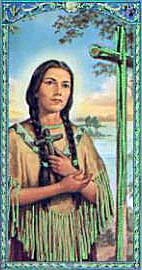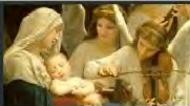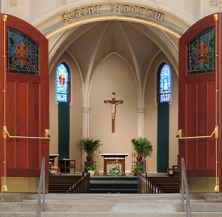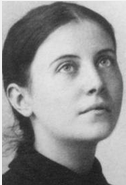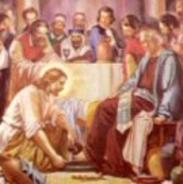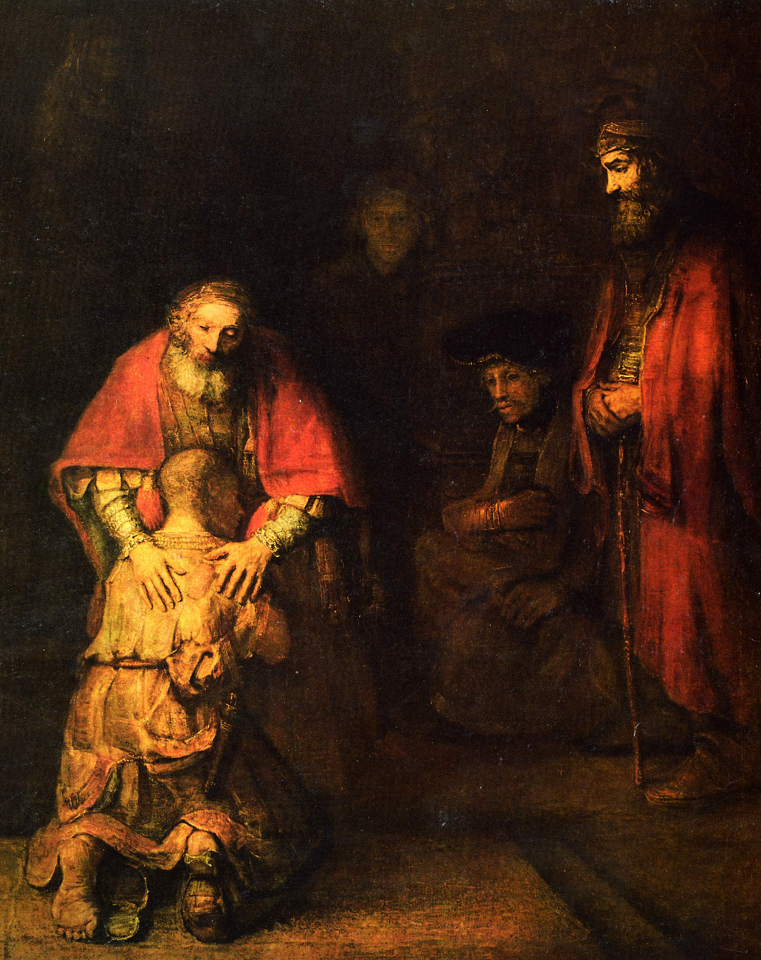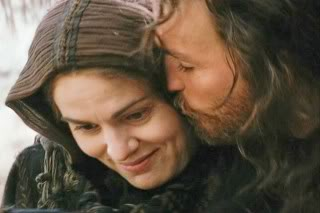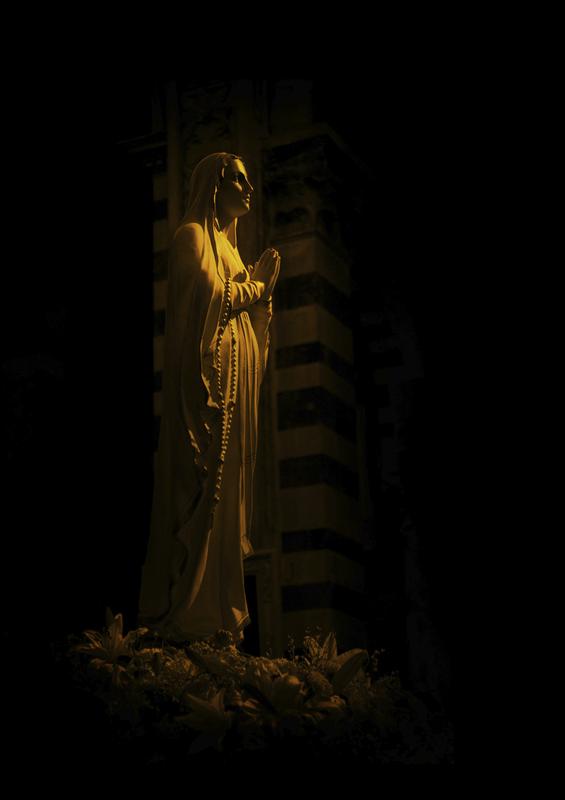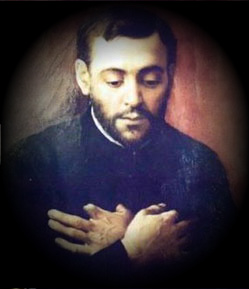.
The Catholic Faith in Brief
We believe in God, the Father Almighty, Creator of heaven and earth and in Jesus Christ, His only Son, our Lord. Who was conceived by the Holy Spirit, born of the Virgin Mary, suffered under Pontius Pilate, was crucified, died, and was buried. He descended to hell. On the third day He rose again. He ascended into heaven, and is seated at the right hand of the Father. He will come again to judge the living and the dead. We believe in the Holy Spirit, the holy Catholic Church, the communion of saints, the forgiveness of sins, the resurrection of the body, and life everlasting. Amen.
Apostles’ Creed
We Catholic Christians believe in one God, the Father Almighty, Creator of all things, seen and unseen. God revealed His name as Yahweh which means "I AM WHO AM" [Ex. 3:14]. This name reveals God as the uncreated source of all being. He also revealed Himself as Love (1 John 4:16) and as Holy (Ps. 99:9; Luke 1:49). He created us so that we might share in His life and love. But He is also Holy and awesome. "Fear of the Lord is the beginning of wisdom." [Ps. 111:10] Our ultimate purpose in life is to share forever in His life and love by knowing, loving and serving Him now (Eccles. 12:13-14).
God created us in His image and likeness (Gen. 1:27; 6:3; John 4:24). This sets us apart from plants and animals. He desires us to love Him, but we can freely choose to love Him or to rebel against Him. God does not force us to love Him in return. Our love is expressed by obeying His commandments (John 14:15; 1 John 5:2-3). Sin is our rejection of God’s friendship by disobeying Him. Adam and Eve, our first parents, chose to reject God and His friendship. This first rebellion is called Original Sin. Because of Adam’s sin, we lost the gift of original holiness and justice (1 Cor. 15:21-22). Men and women became alienated from God and from each other. We now need a Redeemer to reestablish friendship with God.
We believe in Jesus Christ, the only Son of God (Heb. 1; John 1:14). He is the Second Divine Person of the Holy Trinity. The Father and Son are two Divine Persons who love each other (John 10:30). This love bond is the Third Divine Person, the Holy Spirit. There is only one God, yet three Divine Persons. This is professed in the simple verse, "in the name of the Father and of the Son and of the Holy Spirit." [Matt. 28:19]
"But when the time had fully come, God sent forth His Son, born of woman, born under the law, to redeem those who were under the law, so that we might receive adoption as sons." [Gal. 4:4-5]. The first century A.D. marks the time in the history of mankind, when God the Son became man. Christ is true God (John 5:18; 9:38; 20:28; Matt. 4:10; 28:17; Col. 2:9) and true man (1 Tim. 2:5). He was born of the virgin, Mary (Matt. 1:18-23). Since Jesus is a Divine Person and Mary is the mother of Jesus, Mary can be called the Mother of God, even though she is only human and not divine (Luke 1:42-43). Mary directs us to Jesus. Now Jesus came into the world to fully reveal the Father and His love for all mankind. Jesus was crucified under Pontius Pilate. For love of us, He suffered and died on the Cross at the hands of sinful men to save us from Hell (Rom. 5; CCC 633). His sacrifice redeems us from our sins (Rom. 6:6), but it is also an example for us of loving sacrifice (1 Pet. 2:19-24). On the third day, He rose physically from the dead and reestablised the friendship between God and man. Jesus is the Savior of all mankind. Christ gives us back more than Adam lost, so we can say: "O happy fault, O necessary sin of Adam, which gained for us so great a Redeemer!" [Exultet on Holy Saturday]
We are saved by faith in Jesus Christ; however, faith is more than believing in God. "Even the demons believe - and shutter." [James 2:19] Moved by grace, faith is also our turning from selfishness to a reliance on God (CCC 2018). This response includes obedience to God (Rom. 1:5; Heb. 5:9; Matt. 7:21). God wills us to be holy (1 Thess. 4:3-8). We cannot merit Heaven (CCC 1024) by our good works (Eph. 2:8-10), yet Jesus will still judge us all according to our deeds (2 Cor. 5:10; Matt. 25:33ff). Our unrepented mortal (deadly) sins can earn us Hell. We can willfully reject God’s gift of salvation by mortal sin. In similar fashion, voting or jury duty do not merit civil liberties, but committing a felony deserves prison. If we freely choose the pleasures of sin instead of God’s friendship, then we reject faith and choose Hell, which is eternal separation from God (CCC 1033). Fortunately, by the grace and mercy of God, we can repent (while still alive) from our sins and be forgiven by God (CCC 2018). We can be saved from Hell and have eternal life with Jesus. The Blood of Christ washes away the guilt of our sins (1 John 1:7). Purgatory is the fire of God’s love which purges us of the attachment to our sins (Heb. 12:29; 1 Cor. 3:12-15). We are saved by the grace of God which Jesus merited for us on the Cross. Salvation comes from God alone.
This saving grace is received through the Sacraments, beginning with Baptism (Mark 16:16; 1 Pet. 3:21). By the Baptism of water and the Holy Spirit, we receive Sanctifying Grace which makes us right with God (John 3:5; Acts 22:16; 1 Cor. 6:9-11). We are born again as children of God (Titus 3:3-5). Since we can still sin seriously after Baptism and lose the gift of eternal life, Jesus gave us the Sacrament of Penance and Reconciliation (John 20:21-23). In this Sacrament, we can confess our sins and receive God’s forgiveness and graces. God is merciful and forgiving. Jesus also gives us His Body, Blood, Soul and Divinity in the Blessed Sacrament, the Eucharist (John 6; 1 Cor. 11). His Food helps us grow stronger in our friendship with God. The Catholic Church recognizes seven Sacraments - Baptism (Matt. 28:18-19), Reconciliation (John 20:21-23), the Eucharist (1 Cor. 10:16), Confirmation (Acts 8:14-17), Holy Matrimony (Eph. 5:22-32), Holy Orders (Acts 6:5-6) and Anointing of the Sick (Mark 6:13; James 5:14-15). These Sacraments are outward signs instituted by Christ that give us God’s saving graces.
God revealed Himself and His love for us all through Abraham, Moses, the Prophets and finally through His Son - Jesus, the Incarnate Word (John 1:14; Heb. 1:1-3). Through the inspiration of the Holy Spirit, some of God’s revelations were eventually written down as scriptures. These scriptures are books that were later put together into the Bible. The Catholic Church teaches that the Bible is the written Word of God. Inspired by the Holy Spirit, the scriptures were written down by men but authored by God. But the teachings of the Apostles inspired by the Holy Spirit were also transmitted by word of mouth (2 Tim. 2:2). "Stand firm and hold to the traditions which you were taught by us, either by word of mouth or by letter." [2 Thess. 2:15] Even though the Bible is the Word of God, it still needs to be interpreted (2 Pet. 1:20-21). This teaching, which helps us understand and interpret the Bible, is called Sacred Tradition. The Apostle’s Creed is an example of Sacred Tradition that preceeded the Bible. Yet both belong together, since both are inspired of the same Holy Spirit.
Jesus, while on earth, also established His Church. Our friendship with God is personal, but the "Jesus and me" relationship draws us into a community relationship (Gal. 6:10; John 13:34-35; 1 John 4:20-21). God calls us all to friendship as one family, the Church. The members of the Church on earth (the Church Militant) help each other to grow more in the love and friendship of God through Jesus Christ. Jesus Christ is the one mediator between God and man (1 Tim. 2:5), yet we are called upon to pray and intercede for each other (1 Tim. 2:1-2). The saints in Heaven are also part of the Church family (Eph. 3:15). They are alive in Heaven with Jesus (Matt. 22:29-32; Luke 9:30) and are called the Church Triumphant. The saints in Heaven are a "cloud of witnesses." [Heb. 12:1] "There will be more joy in heaven over one sinner who repents than over ninety-nine righteous persons who need no repentance." [Luke 15:7]
The Church can also be seen as the new kingdom. Jesus Christ is King (Luke 1:33), while Mary is His Queen Mother (1 King 2:19; Jer. 29:2). Jesus also chose His representatives and a prime minister to help Him govern His Church (2 Sam. 8:15-18; Isa. 22:20-22; 2 King 18:37). He chose Simon and renamed him as Rock - Peter or Cephas (John 1:42). "And I tell you, you are Peter, and on this rock I will build my church, and the powers of death shall not prevail against it. I will give you the keys of the kingdom of heaven, and whatever you bind on earth shall be bound in heaven, and whatever you loose on earth shall be loosed in heaven." [Matt. 16:18-19; cf. Isa. 22:20-22] The Pope is the successor to St. Peter and the visible leader of the Church on earth.
We believe that we can continue to share in Christ’s Sacrifice and triumph over sin and death. "The Lord Jesus on the night when he was betrayed took bread, and when he had given thanks, he broke it, and said, ‘This is my body which is for you. Do this in remembrance of me.’ ...For as often as you eat this bread and drink the cup, you proclaim the Lord’s death until he comes." [1 Cor. 11:23-26] The Holy Sacrifice of the Mass or celebration of the Eucharist is a commemoration of Our Lord’s Last Supper and at the same time a re-presentation of Our Lord’s Sacrifice on the Cross (Rev. 5:6; CCC 1137). It is the pure Sacrifice as prophesied in Malachi 1:11 (Didache 14).
This short summary only presents a few major points of what Catholics believe. More details on the following topics can be found in the Catechism of the Catholic Church (CCC), under the sections on: God (198-231), Jesus (430-455), Trinity (232-267), Mary (487-511), Original Sin (396-421), Hell (1033-1041), Purgatory (1030-1032), Heaven (1023-1029), Salvation (161,169,1987 -1995), Faith (142-184), Grace (1996 -2029), Tradition (75-100), Bible (101-141), Church (169, 171, 811-879), Pope (880-896), Sacraments (1113-1134) and the Mass (1136-1139; 1341-1382).
NIHIL OBSTAT:
Reverend Mark D. Huber, J.C.L.
Censor Librorum
IMPRIMATUR:
Most Reverend Fabian W. Bruskewitz, D.D., S.T.D.
Bishop of Lincoln
November 16, 1999
The NIHIL OBSTAT and IMPRIMATUR are official declarations that a book or a pamphlet is free from doctrinal or moral error. No implication is contained therein that those who have granted the NIHIL OBSTAT and IMPRIMATUR agree with the contents, opinions, or statements expressed.
P.O. Box 84272
Lincoln, NE 68501-4272
Sacred Tradition should not be confused with customs and disciplines, such as the rosary, priestly celibacy, and not eating meat on Fridays in Lent. These are good and helpful things, but they are not doctrines. Sacred Tradition preserves doctrines first taught by Jesus to the apostles and later passed down to us through the apostles’ successors, the bishops.
Scripture (CCC 101–141)
Scripture, by which we mean the Old and New Testaments, was inspired by God (2 Tim. 3:16). The Holy Spirit guided the biblical authors to write what he wanted them to write. Since God is the principal author of the Bible, and since God is truth itself (John 14:6) and cannot teach anything untrue, the Bible is free from all error in everything it asserts to be true.
Some Christians claim, "The Bible is all I need," but this notion is not taught in the Bible itself. In fact, the Bible teaches the contrary idea (2 Pet. 1:20–21, 3:15–16). The "Bible alone" theory was not believed by anyone in the early Church.
It is new, having arisen only in the 1500s during the Protestant Reformation. The theory is a "tradition of men" that nullifies the Word of God, distorts the true role of the Bible, and undermines the authority of the Church Jesus established (Mark 7:1–8).
Although popular with many "Bible Christian" churches, the "Bible alone" theory simply does not work in practice. Historical experience disproves it. Each year we see additional splintering among "Bible-believing" religions.
Today there are tens of thousands of competing denominations, each insisting its interpretation of the Bible is the correct one. The resulting divisions have caused untold confusion among millions of sincere but misled Christians.
Just open up the Yellow Pages of your telephone book and see how many different denominations are listed, each claiming to go by the "Bible alone," but no two of them agreeing on exactly what the Bible means.
We know this for sure: The Holy Spirit cannot be the author of this confusion (1 Cor. 14:33). God cannot lead people to contradictory beliefs because his truth is one. The conclusion? The "Bible alone" theory must be false.
The Magisterium (CCC 85–87, 888–892)
Together the pope and the bishops form the teaching authority of the Church, which is called the magisterium (from the Latin for "teacher"). The magisterium, guided and protected from error by the Holy Spirit, gives us certainty in matters of doctrine. The Church is the custodian of the Bible and faithfully and accurately proclaims its message, a task which God has empowered it to do.
Keep in mind that the Church came before the New Testament, not the New Testament before the Church. Divinely-inspired members of the Church wrote the books of the New Testament, just as divinely-inspired writers had written the Old Testament, and the Church is guided by the Holy Spirit to guard and interpret the entire Bible, both Old and New Testaments.
Such an official interpreter is absolutely necessary if we are to understand the Bible properly. (We all know what the Constitution says, but we still need a Supreme Court to interpret what it means.)
The magisterium is infallible when it teaches officially because Jesus promised to send the Holy Spirit to guide the apostles and their successors "into all truth" (John 16:12–13).
HOW GOD DISTRIBUTES HIS GIFTS
Jesus promised he would not leave us orphans (John 14:18) but would send the Holy Spirit to guide and protect us (John 15:26). He gave the sacraments to heal, feed, and strengthen us. The seven sacraments —baptism, the Eucharist, penance (also called reconciliation or confession), confirmation, holy orders, matrimony, and the anointing of the sick—are not just symbols. They are signs that actually convey God’s grace and love.
The sacraments were foreshadowed in the Old Testament by things that did not actually convey grace but merely symbolized it (circumcision, for example, prefigured baptism, and the Passover meal prefigured the Eucharist. When Christ came, he did not do away with symbols of God’s grace. He supernaturalized them, energizing them with grace. He made them more than symbols.
God constantly uses material things to show his love and power. After all, matter is not evil. When he created the physical universe, everything God created was "very good" (Gen. 1:31). He takes such delight in matter that he even dignified it through his own Incarnation (John 1:14).
During his earthly ministry Jesus healed, fed, and strengthened people through humble elements such as mud, water, bread, oil, and wine. He could have performed his miracles directly, but he preferred to use material things to bestow his grace.
In his first public miracle Jesus turned water into wine, at the request of his mother, Mary (John 2:1–11). He healed a blind man by rubbing mud on his eyes (John 9:1–7). He multiplied a few loaves and fish into a meal for thousands (John 6:5–13). He changed bread and wine into his own body and blood (Matt. 26:26– 28). Through the sacraments he continues to heal, feed, and strengthen us.
Baptism (CCC 1213–1284)
Because of original sin, we are born without grace in our souls, so there is no way for us to have fellowship with God. Jesus became man to bring us into union with his Father. He said no one can enter the kingdom of God unless he is first born of "water and the Spirit" (John 3:5)—this refers to baptism.
Through baptism we are born again, but this time on a spiritual level instead of a physical level. We are washed in the bath of rebirth (Titus 3:5). We are baptized into Christ’s death and therefore share in his Resurrection (Rom. 6:3–7).
Baptism cleanses us of sins and brings the Holy Spirit and his grace into our souls (Acts 2:38, 22:16). And the apostle Peter is perhaps the most blunt of all: "Baptism now saves you" (1 Pet. 3:21). Baptism is the gateway into the Church.
Penance (CCC 1422–1498)
Sometimes on our journey toward the heavenly promised land we stumble and fall into sin. God is always ready to lift us up and to restore us to grace-filled fellowship with him. He does this through the sacrament of penance (which is also known as confession or reconciliation).
Jesus gave his apostles power and authority to reconcile us to the Father. They received Jesus’ own power to forgive sins when he breathed on them and said, "Receive the Holy Spirit. Whose sins you forgive are forgiven them, and whose sins you retain are retained" (John 20:22–23).
Paul notes that "all this is from God, who has reconciled us to himself through Christ and given us the ministry of reconciliation. . . . So, we are ambassadors for Christ, as if God were appealing through us" (2 Cor. 5:18–20). Through confession to a priest, God’s minister, we have our sins forgiven, and we receive grace to help us resist future temptations.
The Eucharist (CCC 1322–1419)
Once we become members of Christ’s family, he does not let us go hungry, but feeds us with his own body and blood through the Eucharist. In the Old Testament, as they prepared for their journey in the wilderness, God commanded his people to sacrifice a lamb and sprinkle its blood on their doorposts, so the Angel of Death would pass by their homes. Then they ate the lamb to seal their covenant with God.
This lamb prefigured Jesus. He is the real "Lamb of God," who takes away the sins of the world (John 1:29). Through Jesus we enter into a New Covenant with God (Luke 22:20), who protects us from eternal death. God’s Old Testament people ate the Passover lamb. Now we must eat the Lamb that is the Eucharist. Jesus said, "Unless you eat my flesh and drink my blood you have no life within you" (John 6:53).
At the Last Supper he took bread and wine and said, "Take and eat. This is my body . . . This is my blood which will be shed for you" (Mark 14:22–24). In this way Jesus instituted the sacrament of the Eucharist, the sacrificial meal Catholics consume at each Mass.
The Catholic Church teaches that the sacrifice of Christ on the cross occurred "once for all"; it cannot be repeated (Heb. 9:28). Christ does not "die again" during Mass, but the very same sacrifice that occurred on Calvary is made present on the altar. That’s why the Mass is not "another" sacrifice, but a participation in the same, once-for-all sacrifice of Christ on the cross.
Paul reminds us that the bread and the wine really become, by a miracle of God’s grace, the actual body and blood of Jesus: "Anyone who eats and drinks without recognizing the body of the Lord eats and drinks judgment on himself" (1 Cor. 11:27–29).
After the consecration of the bread and wine, no bread or wine remains on the altar. Only Jesus himself, under the appearance of bread and wine, remains.
Confirmation (CCC 1285–1321)
God strengthens our souls in another way, through the sacrament of confirmation. Even though Jesus’ disciples received grace before his Resurrection, on Pentecost the Holy Spirit came to strengthen them with new graces for the difficult work ahead.
They went out and preached the gospel fearlessly and carried out the mission Christ had given them. Later, they laid hands on others to strengthen them as well (Acts 8:14–17). Through confirmation you too are strengthened to meet the spiritual challenges in your life.
Matrimony (CCC 1601–1666)
Most people are called to the married life. Through the sacrament of matrimony God gives special graces to help married couples with life’s difficulties, especially to help them raise their children as loving followers of Christ.
Marriage involves three parties: the bride, the groom, and God. When two Christians receive the sacrament of matrimony, God is with them, witnessing and blessing their marriage covenant. A sacramental marriage is permanent; only death can break it (Mark 10:1–12, Rom. 7:2–3, 1 Cor. 7:10–11). This holy union is a living symbol of the unbreakable relationship between Christ and his Church (Eph. 5:21–33).
Holy Orders (CCC 1536–1600)
Others are called to share specially in Christ’s priesthood. In the Old Covenant, even though Israel was a kingdom of priests (Exod. 19:6), the Lord called certain men to a special priestly ministry (Exod. 19: 22). In the New Covenant, even though Christians are a kingdom of priests (1 Pet. 2:9), Jesus calls certain men to a special priestly ministry (Rom. 15:15–16).
This sacrament is called holy orders. Through it priests are ordained and thus empowered to serve the Church (2 Tim. 1:6–7) as pastors, teachers, and spiritual fathers who heal, feed, and strengthen God’s people—most importantly through preaching and the administration of the sacraments.
Anointing of the Sick (CCC 1499–1532)
Priests care for us when we are physically ill. They do this through the sacrament known as the anointing of the sick. The Bible instructs us, "Is anyone among you suffering? He should pray. . . . Is any one among you sick? He should summon the presbyters [priests] of the Church, and they should pray over him and anoint him with oil in the name of the Lord, and the prayer of faith will save the sick person, and the Lord will raise him up. If he has committed any sins, he will be forgiven" (Jas. 5:14–15). Anointing of the sick not only helps us endure illness, but it cleanses our souls and helps us prepare to meet God.
TALKING WITH GOD AND HIS SAINTS
One of the most important activities for a Catholic is prayer. Without it there can be no true spiritual life. Through personal prayer and the communal prayer of the Church, especially the Mass, we worship and praise God, we express sorrow for our sins, and we intercede on behalf of others (1 Tim. 2:1–4). Through prayer we grow in our relationship with Christ and with members of God’s family (CCC 2663–2696).
This family includes all members of the Church, whether on earth, in heaven, or in purgatory. Since Jesus has only one body, and since death has no power to separate us from Christ (Rom. 8:3–8), Christians who are in heaven or who, before entering heaven, are being purified in purgatory by God’s love (1 Cor. 3:12–15) are still part of the Body of Christ (CCC 962).
Jesus said the second greatest commandment is to "love your neighbor as yourself" (Matt. 22:39). Those in heaven love us more intensely than they ever could have loved us while on earth. They pray for us constantly (Rev. 5:8), and their prayers are powerful (Jas. 5:16, CCC 956, 2683, 2692).
Our prayers to the saints in heaven, asking for their prayers for us, and their intercession with the Father do not undermine Christ’s role as sole Mediator (1 Tim. 2:5). In asking saints in heaven to pray for us we follow Paul’s instructions: "I urge that supplications, prayers, intercessions, and thanksgivings be made for everyone," for "this is good and pleasing to God our Savior" (1 Tim. 2:1–4).
All members of the Body of Christ are called to help one another through prayer (CCC 2647). Mary’s prayers are especially effective on our behalf because of her relationship with her Son (John 2:1–11).
God gave Mary a special role (CCC 490–511, 963– 975). He saved her from all sin (Luke 1:28, 47), made her uniquely blessed among all women (Luke 1:42), and made her a model for all Christians (Luke 1:48). At the end of her life he took her, body and soul, into heaven—an image of our own resurrection at the end of the world (Rev. 12:1–2).
WHAT IS THE PURPOSE OF LIFE?
Old catechisms asked, "Why did God make you?" The answer: "God made me to know him, to love him, and to serve him in this world and to be happy with him forever in the next." Here, in just 26 words, is the whole reason for our existence. Jesus answered the question even more briefly: "I came so that [you] might have life and have it more abundantly" (John 10:10).
God’s plan for you is simple. Your loving Father wants to give you all good things—especially eternal life. Jesus died on the cross to save us all from sin and the eternal separation from God that sin causes (CCC 599–623). When he saves us, he makes us part of his Body, which is the Church (1 Cor. 12:27–30). We thus become united with him and with Christians everywhere (on earth, in heaven, in purgatory).
What You Must Do to Be Saved
Best of all, the promise of eternal life is a gift, freely offered to us by God (CCC 1727). Our initial forgiveness and justification are not things we "earn" (CCC 2010). Jesus is the mediator who bridged the gap of sin that separates us from God (1 Tim. 2:5); he bridged it by dying for us. He has chosen to make us partners in the plan of salvation (1 Cor. 3:9).
The Catholic Church teaches what the apostles taught and what the Bible teaches: We are saved by grace alone, but not by faith alone (which is what "Bible Christians" teach; see Jas. 2:24).
When we come to God and are justified (that is, enter a right relationship with God), nothing preceding justification, whether faith or good works, earns grace. But then God plants his love in our hearts, and we should live out our faith by doing acts of love (Gal. 6:2).
Even though only God’s grace enables us to love others, these acts of love please him, and he promises to reward them with eternal life (Rom. 2:6–7, Gal. 6:6–10). Thus good works are meritorious. When we first come to God in faith, we have nothing in our hands to offer him. Then he gives us grace to obey his commandments in love, and he rewards us with salvation when we offer these acts of love back to him (Rom. 2:6–11, Gal. 6:6–10, Matt. 25:34–40).
Jesus said it is not enough to have faith in him; we also must obey his commandments. "Why do you call me ‘Lord, Lord,’ but do not do the things I command?" (Luke 6:46, Matt. 7:21–23, 19:16–21).
We do not "earn" our salvation through good works (Eph. 2:8–9, Rom. 9:16), but our faith in Christ puts us in a special grace-filled relationship with God so that our obedience and love, combined with our faith, will be rewarded with eternal life (Rom. 2:7, Gal. 6:8–9).
Paul said, "God is the one who, for his good purpose, works in you both to desire and to work" (Phil. 2:13). John explained that "the way we may be sure that we know him is to keep his commandments. Whoever says, ‘I know him,’ but does not keep his commandments is a liar, and the truth is not in him" (1 John 2:3–4, 3:19–24, 5:3–4).
Since no gift can be forced on the recipient—gifts always can be rejected—even after we become justified, we can throw away the gift of salvation. We throw it away through grave (mortal) sin (1 John 5:16, Rom. 11:22–23, 1 Cor. 15:1–2; CCC 1854–1863). Paul tells us, "The wages of sin is death" (Rom. 6:23).
Read his letters and see how often Paul warned Christians against sin! He would not have felt compelled to do so if their sins could not exclude them from heaven (see, for example, 1 Cor. 6:9–10, Gal. 5:19–21).
Paul reminded the Christians in Rome that God "will repay everyone according to his works: eternal life for those who seek glory, honor, and immortality through perseverance in good works, but wrath and fury to those who selfishly disobey the truth and obey wickedness" (Rom. 2:6–8).
Sins are nothing but evil works (CCC 1849–1850). We can avoid sins by habitually performing good works. Every saint has known that the best way to keep free from sins is to embrace regular prayer, the sacraments (the Eucharist first of all), and charitable acts.
Are You Guaranteed Heaven?
Some people promote an especially attractive idea: All true Christians, regardless of how they live, have an absolute assurance of salvation, once they accept Jesus into their hearts as "their personal Lord and Savior." The problem is that this belief is contrary to the Bible and constant Christian teaching.
Keep in mind what Paul told the Christians of his day: "If we have died with him [in baptism; see Rom. 6:3–4] we shall also live with him; if we persevere we shall also reign with him" (2 Tim. 2:11–12).
If we do not persevere, we shall not reign with him. In other words, Christians can forfeit heaven (CCC 1861).
The Bible makes it clear that Christians have a moral assurance of salvation (God will be true to his word and will grant salvation to those who have faith in Christ and are obedient to him [1 John 3:19–24]), but the Bible does not teach that Christians have a guarantee of heaven. There can be no absolute assurance of salvation. Writing to Christians, Paul said, "See, then, the kindness and severity of God: severity toward those who fell, but God’s kindness to you, provided you remain in his kindness, otherwise you too will be cut off" (Rom. 11:22–23; Matt. 18:21–35, 1 Cor. 15:1–2, 2 Pet. 2:20–21).
Note that Paul includes an important condition: "provided you remain in his kindness." He is saying that Christians can lose their salvation by throwing it away. He warns, "Whoever thinks he is standing secure should take care not to fall" (1 Cor. 10:11–12).
If you are Catholic and someone asks you if you have been "saved," you should say, "I am redeemed by the blood of Christ, I trust in him alone for my salvation, and, as the Bible teaches, I am ‘working out my salvation in fear and trembling’ (Phil. 2:12), knowing that it is God’s gift of grace that is working in me."
THE WAVE OF THE FUTURE
All the alternatives to Catholicism are showing themselves to be inadequate: the worn-out secularism that is everywhere around us and that no one any longer finds satisfying, the odd cults and movements that offer temporary community but no permanent home, even the other, incomplete brands of Christianity. As our tired world becomes ever more desperate, people are turning to the one alternative they never really had considered: the Catholic Church. They are coming upon truth in the last place they expected to find it.
Always Attractive
How can this be? Why are so many people seriously looking at the Catholic Church for the first time? Something is pulling them toward it. That something is truth.
This much we know: They are not considering the claims of the Church out of a desire to win public favor. Catholicism, at least nowadays, is never popular. You cannot win a popularity contest by being a faithful Catholic. Our fallen world rewards the clever, not the good. If a Catholic is praised, it is for the worldly skills he demonstrates, not for his Christian virtues.
Although people try to avoid the hard doctrinal and moral truths the Catholic Church offers them (because hard truths demand that lives be changed), they nevertheless are attracted to the Church. When they listen to the pope and the bishops in union with him, they hear words with the ring of truth—even if they find that truth hard to live by.
When they contemplate the history of the Catholic Church and the lives of its saints, they realize there must be something special, maybe something supernatural, about an institution that can produce holy people such as St. Augustine, St. Thomas Aquinas, and Mother Teresa.
When they step off a busy street and into the aisles of an apparently empty Catholic church, they sense not a complete emptiness, but a presence. They sense that Someone resides inside, waiting to comfort them.
They realize that the persistent opposition that confronts the Catholic Church—whether from non-believers or "Bible Christians" or even from people who insist on calling themselves Catholics—is a sign of the Church’s divine origin (John 15:18–21). And they come to suspect that the Catholic Church, of all things, is the wave of the future.
Incomplete Christianity Is Not Enough
Over the last few decades many Catholics have left the Church, many dropping out of religion entirely, many joining other churches. But the traffic has not been in only one direction.
The traffic toward Rome has increased rapidly. Today we are seeing more than a hundred and fifty thousand converts enter the Catholic Church each year in the United States, and in some other places, like the continent of Africa, there are more than a million converts to the Catholic faith each year. People of no religion, lapsed or inactive Catholics, and members of other Christian churches are "coming home to Rome."
They are attracted to the Church for a variety of reasons, but the chief reason they convert is the chief reason you should be Catholic: The solid truth of the Catholic faith.
Our separated brethren hold much Christian truth, but not all of it. We might compare their religion to a stained glass window in which some of the original panes were lost and have been replaced by opaque glass: Something that was present at the beginning is now gone, and something that does not fit has been inserted to fill up the empty space. The unity of the original window has been marred.
When, centuries ago, they split away from the Catholic Church, the theological ancestors of these Christians eliminated some authentic beliefs and added new ones of their own making. The forms of Christianity they established are really incomplete Christianity.
Only the Catholic Church was founded by Jesus, and only it has been able to preserve all Christian truth without any error—and great numbers of people are coming to see this.
YOUR TASKS AS A CATHOLIC
Your tasks as a Catholic, no matter what your age, are three:
Know your Catholic faith.
You cannot live your faith if you do not know it, and you cannot share with others what you do not first make your own (CCC 429). Learning your Catholic faith takes some effort, but it is effort well spent because the study is, quite literally, infinitely rewarding.
Live your Catholic faith.
Your Catholic faith is a public thing. It is not meant to be left behind when you leave home (CCC 2472). But be forewarned: Being a public Catholic involves risk and loss. You will find some doors closed to you. You will lose some friends. You will be considered an outsider. But, as a consolation, remember our Lord’s words to the persecuted: "Rejoice and be glad, for your reward is great in heaven" (Matt. 5:12).
Spread your Catholic faith.
Jesus Christ wants us to bring the whole world into captivity to the truth, and the truth is Jesus himself, who is "the way, and the truth, and the life" (John 14:6). Spreading the faith is a task not only for bishops, priests, and religious—it is a task for all Catholics (CCC 905).
Just before his Ascension, our Lord told his apostles, "Go, therefore, and make disciples of all nations, baptizing them in the name of the Father, and of the Son, and of the Holy Spirit, teaching them to observe all that I have commanded you" (Matt. 28:19–20).
If we want to observe all that Jesus commanded, if we want to believe all he taught, we must follow him through his Church. This is our great challenge—and our great privilege.
Utah Mission Catholic Church directions, Catholic Church Mass times and RCIA Directory for each Utah Parish
Saint Henry Catholic Church Brigham City Utah Visit: www.chooseyourcross.com
Treasured Writing
Evangelization
- Isaiah 6:8b

